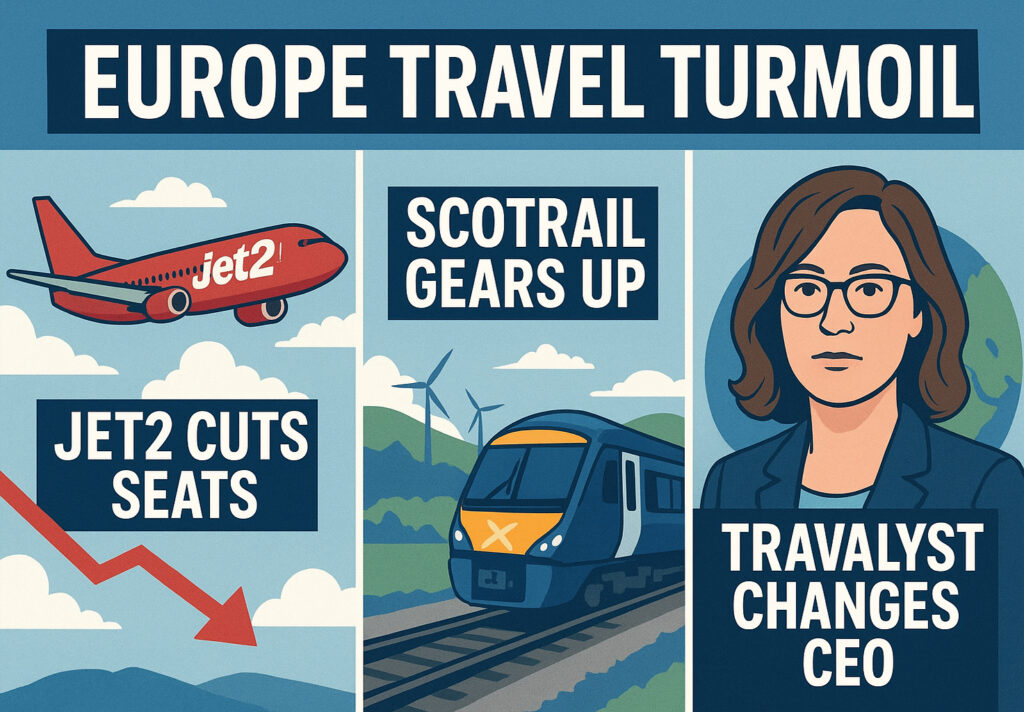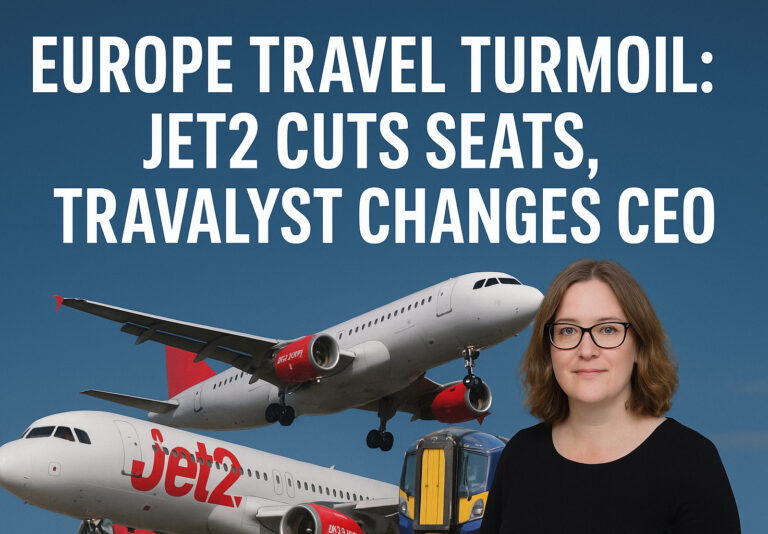Premium Biz Post – The European travel industry is navigating a challenging period marked by shifting consumer demand, leadership shake-ups, and operational changes. Europe Travel Turmoil captures the current volatility in the market as airline. rail operators, and sustainable travel initiatives recalibrate their strategies in response to evolving economic and environmental pressures.
This in-depth report explores the strategic decisions of Jet2, ScotRail, and Travalyst. shedding light on how these moves reflect broader trends across Europe’s travel ecosystem.

Jet2’s Capacity Cut Reflects Market Uncertainty
Jet2, one of the UK’s largest low-cost airlines, recently announced plans to scale back its winter capacity. reducing the number of seats offered from 5.8 million to 5.6 million. The decision, which sent the airline’s stock tumbling nearly 20%, underscores a significant shift in consumer travel behavior.
Industry analysts point to rising living costs, currency fluctuations, and growing domestic tourism as key factors behind the reduced demand for winter holiday packages abroad. British travelers are increasingly opting for local getaways or postponing discretionary travel altogether, creating ripple effects for the airline industry.
Jet2’s leadership, however, remains optimistic. By scaling back capacity, the airline aims to maintain profitability while adjusting to demand fluctuations. The company is also focusing on cost efficiency, route optimization, and loyalty program enhancements to keep customers engaged.
Despite the turbulence, Jet2 continues to emphasize its commitment to high-quality service, competitive pricing, and flexibility. Its strategy may set a precedent for other airlines facing similar market headwinds.
ScotRail Gears Up for Record Passenger Numbers
While Jet2 trims capacity, ScotRail is preparing for a surge in passengers ahead of the highly anticipated Festival of Flight in Ayr, Scotland. Scheduled for September 5–6, 2025, the festival is expected to attract thousands of visitors, putting pressure on Scotland’s rail infrastructure.
To meet demand, ScotRail has added extra carriages and increased service frequency on popular routes, particularly between Glasgow Central and Ayr. The company is also advising passengers to book tickets early and plan for potential delays due to crowding.
Beyond the festival, ScotRail’s proactive measures highlight the importance of scalability and customer-centric planning in the travel sector. By investing in infrastructure upgrades, real-time communication, and operational efficiency, ScotRail is positioning itself as a key player in the UK’s domestic travel market.
The company’s strategy reflects a broader industry trend: rail travel is increasingly seen as a sustainable and efficient alternative to air travel. particularly for short-haul routes across Europe, With governments investing heavily in rail networks. companies like ScotRail are well-placed to capitalize on the growing demand for environmentally friendly travel options.
Read More : ”DIY Crafts A Fun Way to Hone Creativity and Reduce Waste”
Travalyst Faces Leadership Transition Amid Growth Ambitions
Travalyst, the sustainable travel initiative founded by Prince Harry in 2019, is undergoing a major leadership change. CEO Sally Davey has announced her resignation, effective December 2025, marking a pivotal moment for the organization.
Davey’s departure comes after a period of significant growth for Travalyst, which has forged partnerships with major players in the travel industry, including Booking.com, Trip.com, Skyscanner, and Visa. The initiative’s mission is to promote sustainable tourism by providing travelers with data-driven insights and encouraging eco-conscious choices.
In a statement, Davey expressed her unwavering support for Travalyst’s mission, emphasizing her desire to focus on her family while stepping aside for new leadership. The organization has yet to announce her successor, but industry insiders expect a leader with expertise in both sustainability and global business strategy to take the helm.
Travalyst’s leadership transition comes at a time when sustainability is increasingly becoming a competitive differentiator in travel. The company’s partnerships and open-data initiatives are shaping industry standards, signaling a broader shift toward responsible tourism practices.
Economic Pressures on Europe’s Travel Industry
The developments at Jet2, ScotRail, and Travalyst are symptomatic of deeper challenges within Europe’s travel industry. Rising inflation, fluctuating fuel prices, and ongoing geopolitical tensions are all contributing to an unpredictable market environment.
Airlines are particularly vulnerable, as they grapple with razor-thin margins and heightened operational costs. The reduced seat capacity at Jet2 illustrates a cautious approach, balancing supply with demand to protect profitability. Similarly, rail operators are being forced to innovate and scale quickly to accommodate growing interest in domestic and regional travel.
Consumer behavior has also shifted dramatically post-pandemic. While pent-up demand initially drove a surge in bookings, travelers are now becoming more selective. Sustainable travel options, flexible booking policies, and value-for-money experiences are key considerations, prompting companies to rethink their offerings.
Sustainability as a Strategic Priority
Travalyst’s growing influence reflects a broader industry-wide emphasis on sustainability. As environmental concerns rise, travelers are demanding transparency and accountability from travel brands. A growing number of consumers are willing to pay a premium for eco-friendly experiences, pushing airlines, hotels, and tour operators to adopt greener practices.
Rail travel is benefiting from this shift, as governments and private companies invest heavily in high-speed rail networks and green energy. ScotRail’s proactive approach to passenger surges demonstrates the operational flexibility required to cater to this evolving market.
Travalyst, with its global reach and partnerships, is poised to lead the conversation around responsible tourism. Its leadership transition will be closely watched by industry stakeholders eager to see how the organization continues to shape sustainability standards.
Technology and Innovation in Travel
Technology remains a driving force behind the transformation of Europe’s travel landscape. Airlines and rail operators are increasingly adopting AI-powered systems to optimize pricing, streamline operations, and enhance the customer experience.
For instance, Jet2 has invested in predictive analytics to adjust routes and fares dynamically, while ScotRail is leveraging real-time data to manage passenger flow during high-demand events like the Festival of Flight. Travalyst, meanwhile, is building an open-data platform that allows travelers to evaluate their environmental impact and make more sustainable choices.
This focus on innovation is not only improving operational efficiency but also helping companies stay competitive in a market where consumer expectations are rapidly evolving.
Market Reactions and Investor Sentiment
The news of Jet2’s capacity cuts sent shockwaves through the financial markets, with shares dropping nearly 20% in a single day. This reaction underscores the sensitivity of travel stocks to consumer sentiment and macroeconomic indicators.
However, analysts argue that Jet2’s strategic adjustments are a sign of resilience rather than weakness. By managing capacity proactively, the airline may be better positioned to weather economic uncertainty. Similarly, ScotRail’s investment in infrastructure and Travalyst’s emphasis on sustainability are attracting positive attention from investors seeking long-term growth opportunities.
As the European travel industry undergoes these transitions, companies that demonstrate agility, innovation, and a commitment to customer experience are likely to emerge stronger.
The future of Europe’s travel sector will hinge on its ability to balance growth with sustainability, affordability, and innovation. Jet2’s cautious approach, ScotRail’s scalability efforts, and Travalyst’s leadership changes collectively highlight a market in flux.
While short-term challenges remain, these developments also represent opportunities. Airlines are refining their business models, rail networks are expanding, and sustainability initiatives are gaining momentum. For travelers, this means more choice, better value, and greater transparency in the years to come.
Europe’s travel industry is no stranger to disruption, but its ongoing transformation is setting the stage for a more resilient and forward-thinking market. As companies adapt to economic headwinds, technological change, and environmental imperatives, the industry’s next chapter promises to be both challenging and exciting.



